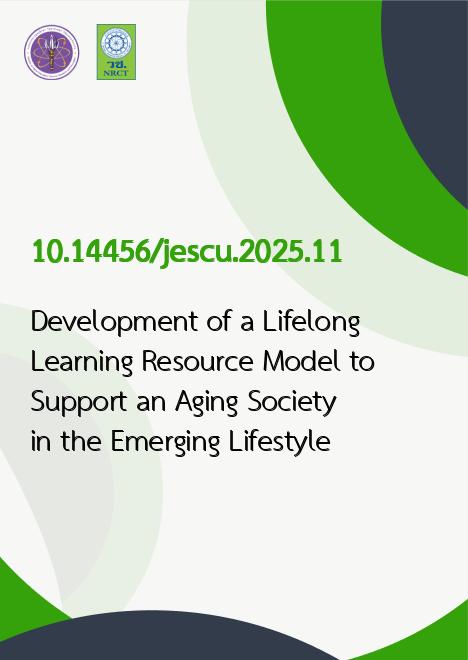
|
Development of a Lifelong Learning Resource Model to Support an Aging Society in the Emerging Lifestyle |
|---|---|
| รหัสดีโอไอ | |
| Creator | Chawalit Kodsiri |
| Title | Development of a Lifelong Learning Resource Model to Support an Aging Society in the Emerging Lifestyle |
| Contributor | Wachira Kruekamai |
| Publisher | Centre for Education Innovation, Print and Online Media |
| Publication Year | 2568 |
| Journal Title | Journal of Education Studies, Chulalongkorn University |
| Journal Vol. | 53 |
| Journal No. | 2 |
| Page no. | JESCU5302001(17pages) |
| Keyword | learning resource, lifelong learning, elderly, emerging lifestyle |
| URL Website | https://so02.tci-thaijo.org/index.php/EDUCU |
| Website title | Journal of Education Studies, Chulalongkorn University |
| ISSN | 3057-1642 (Online) |
| Abstract | This research aimed to: 1) investigate the needs for developing a lifelong learning resource model, 2) develop the lifelong learning resource model, 3) implement the model in real-world settings, and 4) evaluate its effectiveness. A mixed-methods research design was employed. The sample consisted of 60 older adults aged 60 and above, residing in Saluang Sub-district, Mae Rim District, and Choeng Doi Sub-district, Doi Saket District, Chiang Mai Province. The samplers were selected through purposive sampling. Data were collected using structured interviews, observations, and document analysis. Research tools included interview forms, observation checklists, survey instruments, data collection sheets, and group discussion guides. The findings revealed that: 1) the essential requirements for developing the model included self-concept, life experience, learning readiness, orientation to learning, and the use of digital technology; 2) the lifelong learning resource model designed to support an aging society in a post-pandemic context was named the "CHaBA Model" comprising three major components: (1) principles, (2) essential conditions, and (3) four core elements; 3) the implementation of the model across different settings led to clearly observable behavioral improvements, particularly in self-concept, self-esteem, problem-solving abilities, and the transformation of existing competencies into new ones appropriate for older adults. These outcomes achieved a success as measured by behavioral indicators and feedback from local facilitators. Older adults who engaged in problem-centered learning and utilized community-based resources were able to apply their knowledge immediately and effectively in real-life situations; and 4) the consistency index of the model, as evaluated by experts, showed complete agreement, with an index score of 1.00. |